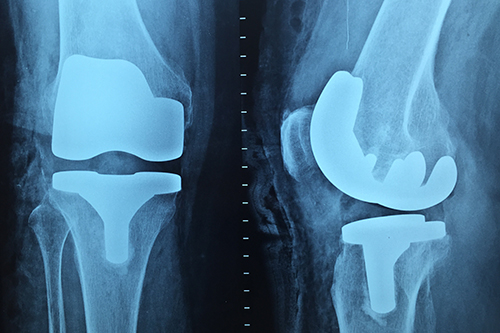Nearly nine months of joint replacement surgery has been lost – around 160,000 fewer operations – since the start of the COVID-19 pandemic, a new study led by the University of Bristol has found.
The research suggests returning to pre-pandemic levels will not tackle the backlog, and even with rapid expansion, it will take many years, if not decades, to fix this joint replacement crisis.
The study, published in The Bone & Joint Journal today [1 August], looked in detail at the effect of the COVID-19 pandemic on the numbers of joint (hip, knee, shoulder, elbow, and ankle) replacement surgery carried out in England, Wales, and Northern Ireland.
The researchers analysed National Joint Registry (NJR) data between January 2019 and December 2022 inclusive, which includes all NHS and privately funded hip, knee, shoulder, elbow, and ankle replacement operations.
The study compared the period including and after the pandemic (2020 to 2022 inclusive) to how many operations would have been performed had surgery continued at the same level as 2019.
The research team found by the end of 2022 almost three quarters of a year of planned operations – 71.6 per cent of 2019 activity and 158,994 joint replacements – had been lost. This gap continues to increase and therefore the recovery from this deficit does not appear to have started. Knee, shoulder, and ankle surgery have been affected more severely than hip and elbow surgery.
The NHS has been more impacted than the private sector. By 2022, NHS activity was still only 73.2 per cent of 2019 levels, whereas operations in the private sector had increased to 126.8 per cent of 2019 levels. The private sector is now the main provider of joint replacements (53 per cent in 2022) in England, Wales, and Northern Ireland.
Wales and Northern Ireland have been worse affected than England. Both countries recorded a backlog of more than a year’s worth of operations between 2020-2022; 136 per cent of 2019 for Wales and 121.3 per cent for Northern Ireland, whereas the deficit in England was 66.7 per cent.
Jonathan French, Clinical Research Fellow in the Bristol Medical School: Translational Health Science (THS), and corresponding author, said: “Patients awaiting different types of joint replacement surgery in England, Wales, and Northern Ireland have been affected disproportionately, and recovery to pre-pandemic levels will be challenging. This will inevitably lead to many patients enduring unnecessary pain, disability and wider decline in mental and physical wellbeing.”
Joint replacement surgery is a common and very effective surgical procedure used to treat a variety of musculoskeletal problems including osteoarthritis and acute trauma. Joint replacements are long-lasting, with over half of hip and knee replacements lasting over 25 years, and 90 per cent of shoulder replacements lasting over ten years.







